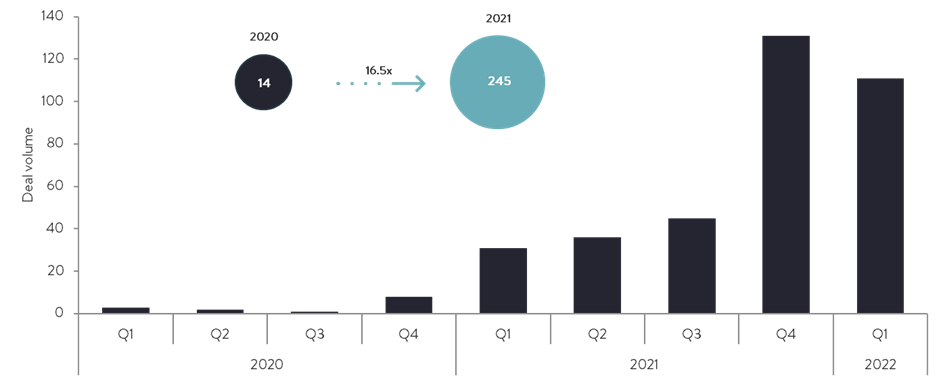What is the metaverse?
“Metaverse” – a term with many meanings, but with common themes related to virtual reality and immersive experiences, online communities, and the creator economy.
The term entered the mainstream when Facebook rebranded itself to Meta in 2021, an act that reflected the social network’s mission to be a pioneer in the new world. Today, metaverse is the biggest buzzword in tech.
According to some, the metaverse is a science fiction future where all digital experiences, objects, and platforms are integrated into one vast, digital universe with its own currency and laws. For others, the metaverse is a virtual world with lifelike player-driven communities, economics, and other elements of the real world, such as events, and branded products.
The former definition is grandiose, complicated, and unlikely to ever happen (at least not any time soon), whereas the latter already exists in some games today.
One example of a virtual reality social experience is Facebook’s Horizon, which allows users to explore, play, and create in virtual reality with others. Another is Fortnite, an online shooter played on computers, game consoles, and mobile devices. Players create personal avatars to fight with and interact with other players. Players also earn virtual currency to unlock outfits and other goodies to customise their avatars.
But if the metaverse is to have a successful future, it must be decentralised, so that users can benefit from it with more privacy, safety, and less manipulation, which requires the transition to web 3.0.
How web 3.0 will complement the metaverse
Web 3.0 is the next-generation decentralised internet built on blockchain technology, including non-fungible tokens (NFTs) and decentralised autonomous organisations (DAOs), rather than servers owned by individuals or corporations.
Non-fungible tokens (NFTs) are digital assets that represent real-world artefacts such as art and music. Decentralised autonomous organisations (DAOs) are not governed by a central authority. Their rules and transactions are recorded on the blockchain. Hence, NFTs provide creator ownership, and DAOs enable governance; both are essential to the metaverse.
Decentralisation is a core element of web 3.0 that promotes seamless communication, usability, and interoperability, which is key in the metaverse. Through web 3.0, people will be empowered to own their data, their followers, their customers, and all the value they accrue online. Therefore, web 3.0 is the building block for the metaverse (Source: Forbes, VentureBeat).
Even with the growth of NFTs and DAOs, there is still a long way to go before the metaverse is fully developed. Web 3.0 is a certainty, but there are a number of challenges that need to be overcome to get there. Blockchain has many limitations, such as its affordability, how easy it is to scale and user accessibility, making mass adoption a long-term goal. However, it is clear how web 3.0 and metaverse will work together interdependently.
The impact on the creator economy
The metaverse is increasingly used not only to meet and interact, but also to buy and sell goods, services, entertainment, and experiences. Together, brands and creators can capitalise on this opportunity. It offers creators a commercial enterprise through selling products, showcasing their NFT collections, and dressing up their avatars in virtual fashion NFTs.
Collaboration with businesses and brands is expected to play a major role in this, bringing influencer marketing to a whole new level. This is because the metaverse will create virtual goods such as avatar fashion, design pieces for digital spaces and much more.
It’s a win-win-win situation for creators, communities, and the metaverse itself. A creator’s success depends on reaching a large audience and monetising their work, and the metaverse allows creators to create new assets and trade them across different digital spaces.
M&A and fundraising activity accelerates around the metaverse
In 2021, news of M&A deals with metaverse companies poured in with more than 16 times as many transactions as in 2020.

There have already been more than 100 deals completed in Q1 2022, including Microsoft’s acquisition of Activision Blizzard for $68.7bn, their largest acquisition to date.
More notable recent deals in this space include:
- TFKT Studios, best known for its line of high-end digital clothing, was acquired by Nike. This will enable Nike to serve athletes and creators at the intersection of sport, creativity, gaming, and culture.
- Pokémon Go developer Niantic has acquired Lowkey, an editing/sharing platform for social gameplay videos. It is part of Niantic’s AR/metaverse strategy and follows a $300m raise at $9bn.
- Fortnite developer Epic Games has acquired Harmonix, a studio specialising in music-focused games. This acquisition will help Epic create more immersive content related to the metaverse
- A metaverse platform provider, GatherTown, raised $50m in a Series B led by Sequoia and Index. The company raised a $26m Series A in March 2021 and has now raised a total of $76m this year.
- SoftBank led a $93m Series B round for Sandbox, an open NFT platform. This is the first investment by SoftBank’s Vision Fund II in a crypto asset.
Companies developing artificial intelligence (AI), virtual reality (VR), and augmented reality (AR) will be attractive acquisition targets. Tech giants, online gaming companies, and other disruptors are heavily investing in these technologies to shape the development of infrastructure and take advantage of opportunities in this rapidly expanding digital ecosystem (Source: PwC). We can expect more M&A activity as interest in the metaverse grows.
What’s next?
Metaverse hype is largely due to Mark Zuckerberg rebranding Facebook as Meta, which sparked global investor interest. Tech giants like Microsoft have begun formulating their own metaverse plans.
However, a true metaverse does not yet exist, and it is unlikely to do so any time soon. In its full form, the metaverse won’t be realised for many years, and so as a concept the metaverse is losing interest.
There is still a lot to do both on the technology side and on the user experience side, as well as on the blockchain side. It is a conceptual leap from the established digital media platforms we use today, and is unlikely to be accepted by people for a long time. Do people really want to spend large amounts of time in virtual worlds?
In any case, we should keep an eye on it. There is substantial investment going into its development at every level of the value chain, including hardware and software. These numbers cannot be ignored.
Like the physical world, the digital world continues to rapidly evolve. The metaverse will experience rapid innovation and development in the coming years. No one can predict how everything will play out, but one thing is for sure – it is going to be a very exciting time to be in the marketing business.
WY Partners offers specialist M&A advice to businesses who are seeking to either buy, sell or raise investment at the intersection of media and technology.
Find out more about what we do here.
Contact hello@wypartners.com if you have any questions or wish to discuss anything further.


